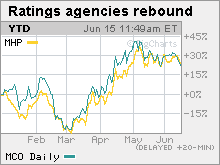Investors give ratings agencies an FFF
Geithner and Summers say they want to reduce reliance on maligned credit rating firms. Shares of Standard & Poor's parent McGraw Hill and Moody's take a hit.

 |
| Shares of Moody's (MCO) and Standard & Poor's owner McGraw-Hill (MHP) have soared in the past few months after a rough start to 2009. |
NEW YORK (CNNMoney.com) -- Is the government going to make life even tougher for Standard & Poor's, Moody's and other credit rating firms?
Many investors have already lost faith in the major rating agencies in the wake of the financial meltdown. Critics argue that S&P, Moody's and others were slow to downgrade risky securities and companies that were tied to subprime loans and other exotic assets.
Now it appears that government regulators want to further marginalize the rating firms. The Obama administration will unveil its much anticipated financial regulatory reform plan later this week.
Treasury Secretary Tim Geithner and Director of the National Economic Council, Lawrence Summers, unveiled some of the components of the plan in the Washington Post Monday.
Geithner and Summers wrote that the administration will seek to "reduce investors' and regulators' reliance on credit-rating agencies."
Doing so probably makes sense since the way many ratings agencies conduct business has created some conflicts. One big issue: The system is set up so issuers of bonds pay the major rating firms to have their debt graded. As a result, some propose that big ratings agencies should be paid by investors. That's already how many smaller ratings firms do business.
Even though Geithner and Summers did not provide any more details, the news did pressure stocks of the companies that own the two biggest rating firms. Spokespeople at S&P and Moody's were not immediately available for comment.
Talkback: Should regulators impose more rules and regulations on credit rating agencies? Leave your comments at the bottom of this story.
On an overall gloomy day for the markets (the Dow was off more than 2% in early afternoon trading), shares of S&P parent company McGraw-Hill (MHP, Fortune 500) fell nearly 5% while Moody's (MCO) stock was down almost 6%. (McGraw-Hill also owns a large educational publishing division, as well as BusinessWeek magazine and customer research firm J.D. Power & Associates.)
John Mitchell, co-manager of the Manning & Napier Financial Services fund, which owns shares of both companies, said he thinks much of the concerns about regulation are already priced into both stocks. He called a switch to a model where investors pay for ratings the "worst-case scenario for the industry" but added he didn't think that would happen.
"There probably will be additional oversight and regulation and more disclosure requirements from the rating agencies but no major changes to the business model," he said.
Both stocks have soared, along with the broader market, in the past three months on hopes that the worst of the financial sector's problems may be behind us.
In fact, Moody's chief executive officer told investors at a presentation earlier this month that the company expected its earnings for 2009 to be at the upper end of its forecasts.
A key reason: The company said it is experiencing an uptick in demand for corporate bond ratings as firms seek to take advantage of a return to normalcy in the credit markets by issuing debt.
Still, the possibility of tougher regulatory rules governing the likes of Moody's and S&P could put a dent in investors' hopes.
To be fair, S&P and Moody's, as well as other the leading agency Fitch, which is owned by French conglomerate Fimalac, have been getting tougher on big corporations recently. (Shares of Fimalac were down slightly in trading in Paris on Monday.)
General Electric (GE, Fortune 500), Berkshire Hathaway (BRKA, Fortune 500) and Toyota Motor (TM), to name a few, have all been stripped of their pristine triple-A credit ratings by one or more of these firms in recent months.
Ironically, Moody's knocked down the rating of Warren Buffett's Berkshire Hathaway -- the largest shareholder of Moody's.
If the government is successful in minimizing the reliance on credit ratings -- and again, there are no specifics announced yet -- that would hurt Moody's more than McGraw-Hill.
In its first quarter, Moody's generated two-thirds of its revenue from its rating services. The remainder came from its analytics unit, which consists of software, consulting and economic research businesses.
McGraw-Hill, on the other hand, relies far less on its ratings. The company's Standard & Poor's Credit Market Services division accounted for about 34% of McGraw-Hill's sales in the first quarter.
That's still a pretty significant chunk of its revenue though. So it goes without saying that if regulators are able to impose any major changes, it could be a big blow for both McGraw-Hill and Moody's.
Will the sell-off in the two stocks continue past Monday? It's hard to know until more details come out.
Manning & Napier's Mitchell said he believes that the government is probably going to focus mainly on changes in how ratings for asset-backed securities such as mortgage-backed bonds are done. And since that market has pretty much dried up, there is little to rate anyway.
But even the threat of regulatory reform can't be considered a good thing for the stocks -- and you need look no further than how healthcare stocks have done in recent weeks to be able to figure that out. So that could mean that the rebound in Moody's and McGraw-Hill since March may be over for the time being.
Talkback: Should regulators impose more rules and regulations on credit rating agencies? ![]()

